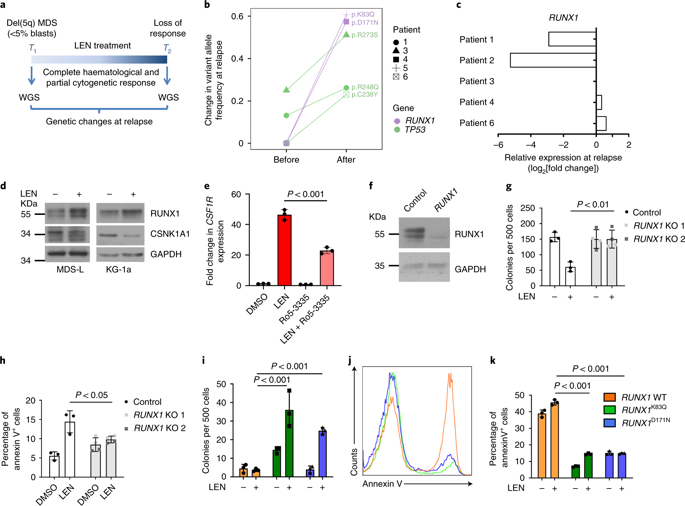当前位置:
X-MOL 学术
›
Nat. Cell Biol.
›
论文详情
Our official English website, www.x-mol.net, welcomes your
feedback! (Note: you will need to create a separate account there.)
Loss of lenalidomide-induced megakaryocytic differentiation leads to therapy resistance in del(5q) myelodysplastic syndrome.
Nature Cell Biology ( IF 17.3 ) Pub Date : 2020-04-06 , DOI: 10.1038/s41556-020-0497-9 Sergio Martinez-Høyer 1, 2 , Yu Deng 1, 3 , Jeremy Parker 1 , Jihong Jiang 1, 3 , Angela Mo 1, 3 , T Roderick Docking 1 , Nadia Gharaee 1, 3 , Jenny Li 1 , Patricia Umlandt 1 , Megan Fuller 1 , Martin Jädersten 4 , Austin Kulasekararaj 5 , Luca Malcovati 6 , Alan F List 7 , Eva Hellström-Lindberg 4 , Uwe Platzbecker 8 , Aly Karsan 1, 3
Nature Cell Biology ( IF 17.3 ) Pub Date : 2020-04-06 , DOI: 10.1038/s41556-020-0497-9 Sergio Martinez-Høyer 1, 2 , Yu Deng 1, 3 , Jeremy Parker 1 , Jihong Jiang 1, 3 , Angela Mo 1, 3 , T Roderick Docking 1 , Nadia Gharaee 1, 3 , Jenny Li 1 , Patricia Umlandt 1 , Megan Fuller 1 , Martin Jädersten 4 , Austin Kulasekararaj 5 , Luca Malcovati 6 , Alan F List 7 , Eva Hellström-Lindberg 4 , Uwe Platzbecker 8 , Aly Karsan 1, 3
Affiliation

|
Interstitial deletion of the long arm of chromosome 5 (del(5q)) is the most common structural genomic variant in myelodysplastic syndromes (MDS)1. Lenalidomide (LEN) is the treatment of choice for patients with del(5q) MDS, but half of the responding patients become resistant2 within 2 years. TP53 mutations are detected in ~20% of LEN-resistant patients3. Here we show that patients who become resistant to LEN harbour recurrent variants of TP53 or RUNX1. LEN upregulated RUNX1 protein and function in a CRBN- and TP53-dependent manner in del(5q) cells, and mutation or downregulation of RUNX1 rendered cells resistant to LEN. LEN induced megakaryocytic differentiation of del(5q) cells followed by cell death that was dependent on calpain activation and CSNK1A1 degradation4,5. We also identified GATA2 as a LEN-responsive gene that is required for LEN-induced megakaryocyte differentiation. Megakaryocytic gene-promoter analyses suggested that LEN-induced degradation of IKZF1 enables a RUNX1-GATA2 complex to drive megakaryocytic differentiation. Overexpression of GATA2 restored LEN sensitivity in the context of RUNX1 or TP53 mutations by enhancing LEN-induced megakaryocytic differentiation. Screening for mutations that block LEN-induced megakaryocytic differentiation should identify patients who are resistant to LEN.
中文翻译:

来那度胺诱导的巨核细胞分化的丧失导致del(5q)骨髓增生异常综合症的治疗抗性。
间质性删除5号染色体的长臂(del(5q))是骨髓增生异常综合征(MDS)1中最常见的结构基因组变异。来那度胺(LEN)是del(5q)MDS患者的首选治疗方法,但是有一半的反应患者在2年内变得耐药。在约20%的LEN耐药患者中检测到TP53突变3。在这里,我们显示出对LEN产生抵抗力的患者带有TP53或RUNX1的复发变异。LEN在del(5q)细胞中上调RUNX1蛋白并以CRBN和TP53依赖性方式起作用,而RUNX1的突变或下调使细胞对LEN产生抗性。LEN诱导del(5q)细胞发生巨核细胞分化,随后细胞死亡取决于钙蛋白酶激活和CSNK1A1降解4,5。我们还确定GATA2为LEN诱导的巨核细胞分化所需的LEN响应基因。巨核细胞基因启动子分析表明,LEN诱导的IKZF1降解使RUNX1-GATA2复合体能够驱动巨核细胞分化。通过增强LEN诱导的巨核细胞分化,在RUNX1或TP53突变的情况下,GATA2的过表达恢复了LEN敏感性。筛选可阻断LEN诱导的巨核细胞分化的突变,应可识别出对LEN耐药的患者。通过增强LEN诱导的巨核细胞分化,在RUNX1或TP53突变的情况下,GATA2的过表达恢复了LEN敏感性。筛选可阻断LEN诱导的巨核细胞分化的突变,应可识别出对LEN耐药的患者。通过增强LEN诱导的巨核细胞分化,在RUNX1或TP53突变的情况下,GATA2的过表达恢复了LEN敏感性。筛选可阻断LEN诱导的巨核细胞分化的突变,应可识别出对LEN耐药的患者。
更新日期:2020-04-24
中文翻译:

来那度胺诱导的巨核细胞分化的丧失导致del(5q)骨髓增生异常综合症的治疗抗性。
间质性删除5号染色体的长臂(del(5q))是骨髓增生异常综合征(MDS)1中最常见的结构基因组变异。来那度胺(LEN)是del(5q)MDS患者的首选治疗方法,但是有一半的反应患者在2年内变得耐药。在约20%的LEN耐药患者中检测到TP53突变3。在这里,我们显示出对LEN产生抵抗力的患者带有TP53或RUNX1的复发变异。LEN在del(5q)细胞中上调RUNX1蛋白并以CRBN和TP53依赖性方式起作用,而RUNX1的突变或下调使细胞对LEN产生抗性。LEN诱导del(5q)细胞发生巨核细胞分化,随后细胞死亡取决于钙蛋白酶激活和CSNK1A1降解4,5。我们还确定GATA2为LEN诱导的巨核细胞分化所需的LEN响应基因。巨核细胞基因启动子分析表明,LEN诱导的IKZF1降解使RUNX1-GATA2复合体能够驱动巨核细胞分化。通过增强LEN诱导的巨核细胞分化,在RUNX1或TP53突变的情况下,GATA2的过表达恢复了LEN敏感性。筛选可阻断LEN诱导的巨核细胞分化的突变,应可识别出对LEN耐药的患者。通过增强LEN诱导的巨核细胞分化,在RUNX1或TP53突变的情况下,GATA2的过表达恢复了LEN敏感性。筛选可阻断LEN诱导的巨核细胞分化的突变,应可识别出对LEN耐药的患者。通过增强LEN诱导的巨核细胞分化,在RUNX1或TP53突变的情况下,GATA2的过表达恢复了LEN敏感性。筛选可阻断LEN诱导的巨核细胞分化的突变,应可识别出对LEN耐药的患者。











































 京公网安备 11010802027423号
京公网安备 11010802027423号